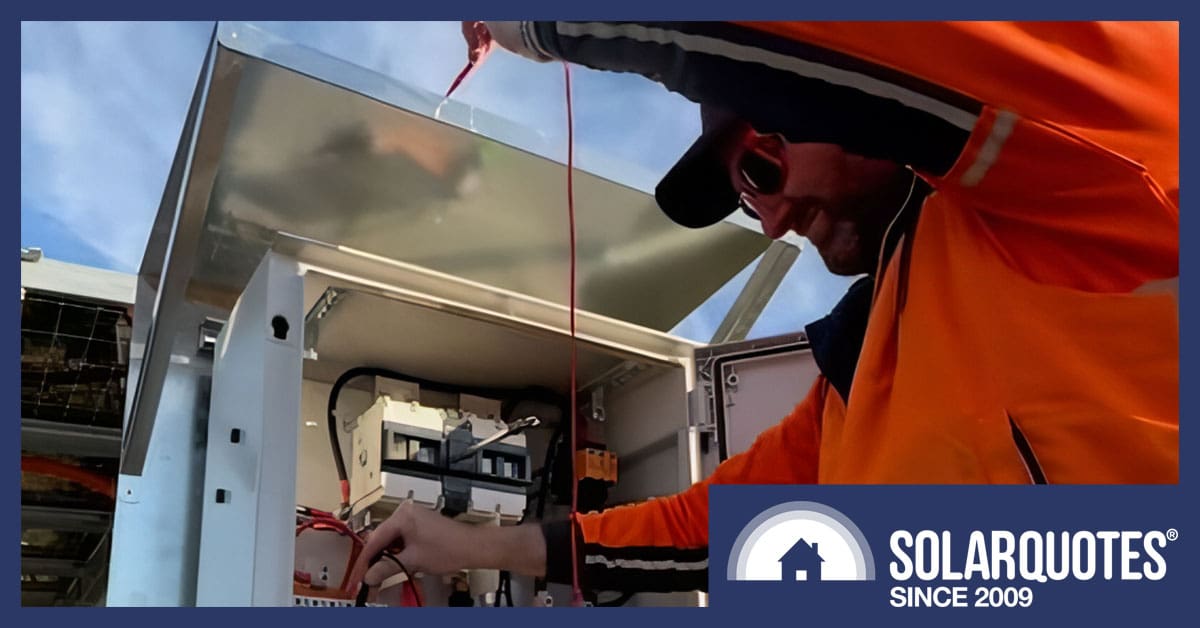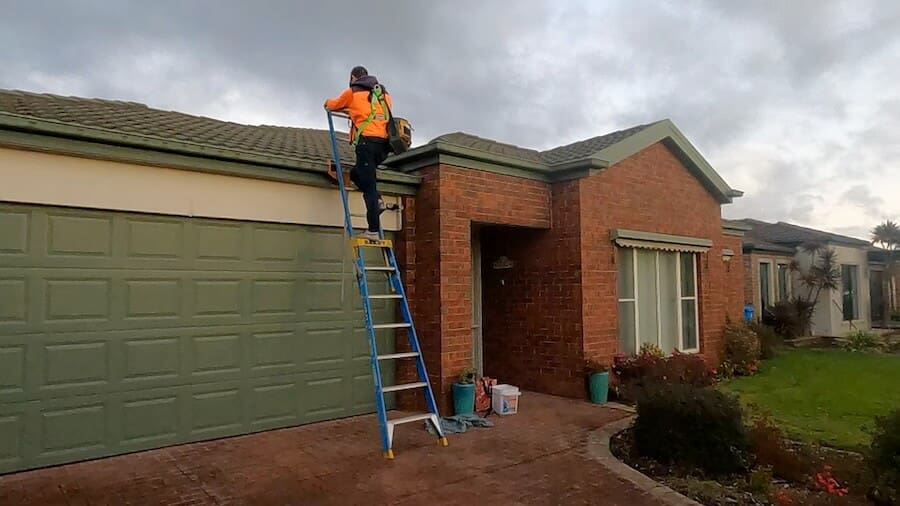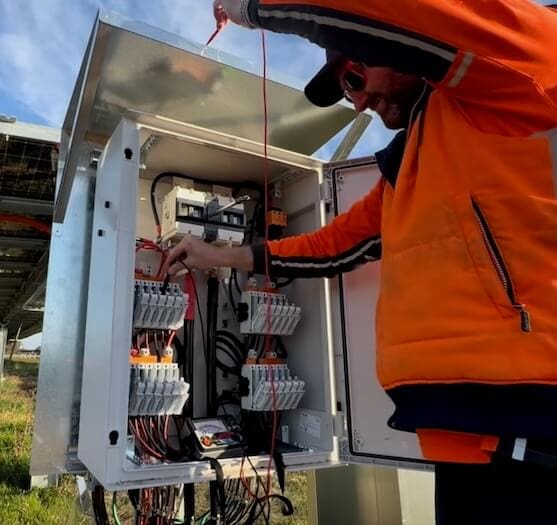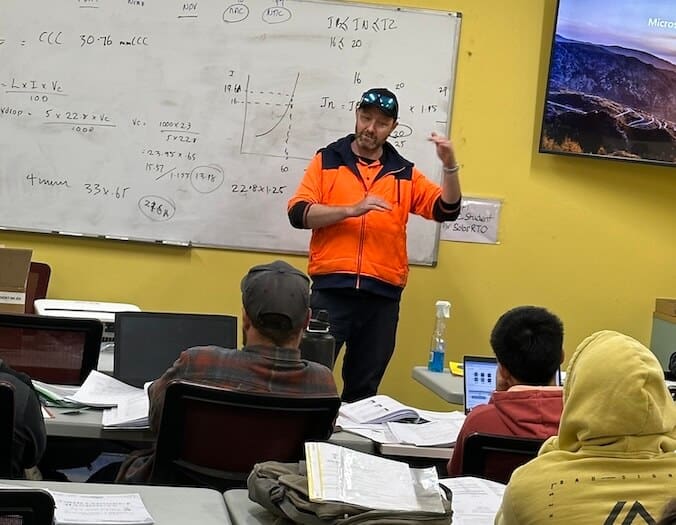
Hi there! I’m Pat Southwell, and I’ve been a Licensed Electrical Inspector (LEI) in Victoria for nearly three years. If you’re a Victorian reader, you’re likely aware that all solar installations in our state are inspected. If you’re outside Victoria, you might still experience inspections through the Clean Energy Regulator (CER) or other state government programs. These inspections are likely similar in scope, though they may not always be performed by trained or qualified inspectors—another tick for Victoria.
What Happens During an Inspection
When it comes to inspecting solar or battery installations, here’s what you can expect from a good inspector:
Getting on the Roof
The roof is where 90% of defects are found, including panels, mounts, and wiring issues. An inspector who doesn’t get on the roof is not doing their job. They should also check the roof cavity if DC cables are part of the installation. Extra points if they work safely at heights and wear a harness.
Performing Mandatory Tests
Inspectors must perform a series of mandatory tests using appropriate equipment such as an insulation resistance tester, voltmeter, clamp meter, and trailing earth lead. Testing is crucial to the required checks and must be performed every time. These tests ensure the electrical connections are secure, the insulation is intact, and the system functions correctly and reliably.
Being a Mentor
A good inspector mentors the electrician/installer, sharing expert knowledge and experience to improve everyone’s skills. They should provide constructive feedback and support, helping solar installers learn and improve their work. If there’s an issue, it should be treated as a learning experience, not an opportunity to be arrogant or dismissive. This mentoring approach improves the quality of installations and fosters a culture of continuous improvement and professional development in the industry.
A new wave of LEIs is changing how they operate compared to how it has been for 20-25 years. With most of the old SEC inspectors hitting retirement, some younger inspectors have come in with a fresh attitude. Not to say all older inspectors are bad news because some are the smartest people I have ever met. But things are certainly changing, and it is definitely for the betterment of the industry.
Preparing for an Inspection
Preparation is key to a smooth inspection. Here’s a quick checklist:
- Ensure Access: Make sure the inspector can easily access all parts of the system.
- Review Documentation: Have all installation and warranty documents ready.
- Clean the Area: Remove any debris or obstacles that might hinder the inspection.
The Importance of Solar Inspections
Solar inspections are vital for maintaining your system’s safety. Over time, components can degrade and new issues can arise. Identifying poor workmanship will prolong its lifespan and maximize your investment. It will also keep the solar company honest.
Conclusion
Inspections are crucial for ensuring the safety and effectiveness of your solar system. They help identify potential issues and maintain high industry standards. Moreover, inspectors can provide valuable advice on how your system works and how to keep it safe. By being prepared for your inspection, you can ensure a smooth process and lower the likelihood of inconvenience, ensuring your solar system remains a reliable and valuable investment for years to come.
Feel free to share your experiences of solar and battery inspections in the comments.




 RSS - Posts
RSS - Posts



Australia has one of the highest quality solar installation standards in the world thanks to our compulsory training requirements under the SRES and because of enforcement through mandatory inspections.
Thank you Pat for raising the bar and ensuring safe and quality solar installations are being done here in Victoria.
Thanks Glen, I agree that we have some of the safest standards in the world, backed up by quality training.
When I look at the stats from all the states, it makes me proud to be a Victorian.
Pat.
Good article.
Who organises the EI?
If it’s the installer, are there potential issues there?
If you think your EI is not doing the things you recommended, what can or should the owner do?
If the EI requires more whatever to provide safe access to inspect is that the installers responsibility?
Hi Bruce, In Victoria the inspection is organised by the electrical contractor. What you are saying is correct, that such a system may have potential issues, especially if the Inspector is not ethical. It’s important to understand that all LEIs have their licences issues and held by ESV (Energy Safe Victoria). They are on to this type of behaviour and and LEI either not getting on the roof or not attending the installs they sign off is risking their LEI licence which is their livelihood. If you think that your LEI is not doing their job, report it to ESV. I would also question the installer or the Electrical contractor if you suspect this, as they may not know this is the case and my be at risk themselves as a result.
No such Inspections happening for here in NSW.
Who should I get?
That’s great but the other stuff of the coin is the same with anything the here. It’s about compliance enforcement via penalties and control over what individuals do and also removing more freedom and the right to private property.
You may argue that safety is paramount and people must be forced to comply. If that’s the case you have pin pointed the underlying root cause of so many societal and national problems. The control, nanny police state and people basically dobbing in others for no good reason.. my safety is my own concern and not that of others.
I’m a libertarian and in my mind any type of government writ stops at my front gate.
As an experienced, qualified and practical Electric Engineer I was SHOCKED at the dominant, smart alec, insolent attitude of the EI. He had his nose out-of-joint as he had to return to site as he didn’t bother to book a visit time with me to get access to the installation; I was at the doctors the first time he turned up unannounced.
He labelled one CB on the switchboard with black marker pen when he should have insisted on physical relocation of the CB to another more safe location by the installation Contractor.
I withheld 10% payment on the Installation Contractor until he had arranged the CB’s in groups, one batch fed from the Grid, the other fed from the Battery supply.
Sandra S – hmmmm! I just had my new solar installation inspected as per Victorian rules! Did NOT get on the roof ( I have a double storey place) or in the roof cavity. Just looked in the power box and at the inverter and stuck some tools in some holes! Took 5-10 mins max! Should I be concerned?
Here i am in Brisbane and no info on how to an inspection when my Solar is installed. I have just had a very competent private inspector pre-inspect the site prior to pouring on the concrete. If they find any irregularities they report to the builder, owner and the men on site before the concrete is poured. The builder has to rectify and provide photographs of their remedial work. It works fine. But what about Solar? I have not found anyone to pre-inspect the Solar setup before it is installed!and after it is installed.
Pat – your articles are great – Please Please give us some detailed advice on how to arrange a Private Inspector to overlook the Solar instalation at the best time.
Just received email notifying of being randomly selected for inspection. Am in Queensland.
First thought was, what the heck is this, a scam?
Then found this blog. Thanks. Seems being selected by the CER is actually a good thing, … unless you’re a libertarian.